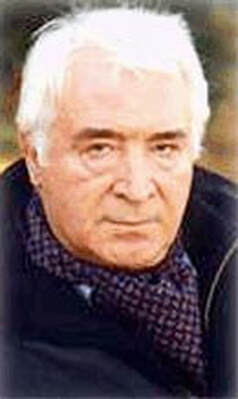 Photo: https://www.babelio.com/livres/Kantchev-Veilleur-de-nuit-de-laurore/199223 I first became acquainted with the poetry of Nikolaï Kantchev in several issues of Visions International. Kantchev (1938 – 2007) was a Bulgarian poet, recognized after the fall of the Communist regime as one of the great Bulgarian poets of the 20th century. His first poems were published in 1957. He was barred from publishing from 1968 to 1980, but then published around thirty collections before his death in 2007. He has been translated into French (the French Wikipedia article is the source of my biographical and publication information) and several other languages, including Spanish, Italian, German, and Polish.
The English translations in Visions International are by Pamela Perry, a folklorist specializing in Bulgaria, and by Bradley Strahan, poet and editor of Visions International. Kantchev sent to Pam his own rough literal translations into English; she cleaned them up and sent them to Brad who, he writes, “to the best of my ability, … tried to make them work poetically in English without losing the intent and nature of the original.” Hopes for publishing a collection didn’t work out, but Visions continues to publish the translations. For Brad, it is a personal as well as literary project. In 2003, when he was in Macedonia on a Fulbright, he met Kantchev in Sofia after a scary bus ride through the mountains. The first of Kantchev’s poems that caught my attention was “Wonders,” in number 92 of Visions International and reprinted here with permission: Wonders Wherever I look wonders tremble in a haze. A sunflower hurls a shining hare into space while my right hand speaks to my left. Facing my doppelganger I reply to my face, Forgetting that the earth's skin bleeds with lava. A treacherous wave sweeps toward us from the sea, while the angry man's head becomes thoughtless fist. There's no golden mean where they rule. Let the one who claims you don't need wings to fly drag himself over the land with a sea-snake's legs. Uncovered during the night, I half close my eyes to see if the cold will melt the Arctic. Later the artificial ice will turn to glass. White crows are perched on a snowy peak. Toward evening they strew their feathers on the milky-say. Even if it's Turkish-blue, the azure can't become a sultan, though the moonlit beach glows with naked women. In this place where the young have old testament faces the plain is still grass and the grass a plain. Here I've become the fourth leaf of a clover. Let darkness spend the day in a well! Let our ears be locked away from evil, so that Cerberus' barking can't be heard. With unheard words love half opens the world. Every echo shall carry the flag of love's voice. According to Wikipedia, Kantchev’s poetic practice employs many forms, combining modern and archaic techniques so as to offer, in the course of his books, a “personal synthesis of the history of poetry, whose epochs all appear as contemporary.” The wide range of cultural, historical, and literary references in “Wonders” supports the accuracy of this generalization. Though perhaps the poet would disagree--"that is not what I meant at all"--his work seems to participate in our long historical moment in literature, where the past, as Eliot wrote, becomes “fragments I have shored against my ruins.”
0 Comments
 After ten years of work, especially during the year of lockdowns, I have a new book out—my annotated edition of an old, relatively obscure book, My Own Life or, A Deserted Wife, a memoir first published in 1898 by Ida Beard, a thirty-six year old woman from Winston-Salem, with only a grade-school education. She wrote the story of her life and her failed marriage to keep herself and her children from starving. It is available on Amazon in paperback and Kindle or directly from me; for a copy, message me on FB or send an email (jsabsherphd @sign gmail.com).
I will be writing more about Ida and her world. Set during the rise of a prosperous tobacco city, the Panic of 1893, and the coming of Jim Crow, her book has about everything—romantic love, neglect and abuse and attempted murder, a wicked stepmother and runaway sisters, tragic deaths, a race riot, fraud and deceit, the disastrous effects of economic depression, unexpected kindness, persistence in the face of adversity—and the intercession of friendly ghosts. To sell her book, Ida traveled the country for 30 years and eventually sold 90,000 copies. Sales from this book will support my research into my next topic, a group portrait of the 50 African American men arrested in Winston-Salem, in 1895, for their part in preventing a lynching (this is the race riot referred to above). I’m interested in who they were (their backgrounds, professions/trades, family and social relationships, church affiliations, etc.), and, to the extent it’s possible to determine, why they acted as they did—that is, arming themselves, standing guard over the jail, and refusing to disperse despite the apparently sincere assurances of town officials. |
AuthorWrite something about yourself. No need to be fancy, just an overview. Archives
July 2024
Categories |
 RSS Feed
RSS Feed